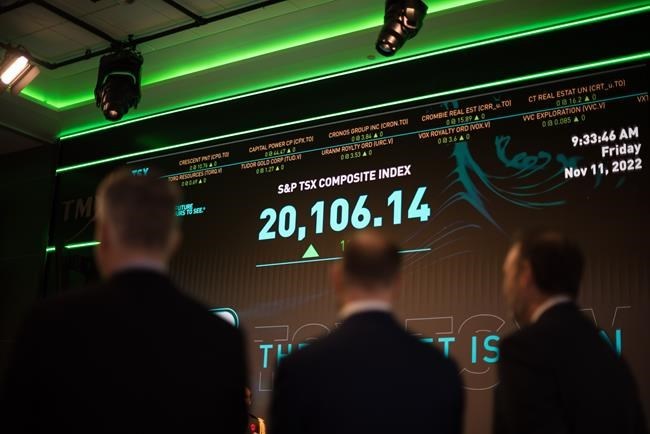TORONTO — Canada's main stock index declined more than 200 points on Tuesday after the long weekend, pulled down by losses in industrial, tech and telecom stocks, while U.S. markets were also down as discussions over a deal on the country's debt ceiling continued.
The debt ceiling talks are overshadowing markets with uncertainty and stress, even though investors don’t think the U.S. will come to a default, said Michael Currie, senior investment adviser at TD Wealth.
The Democrats and Republicans still haven’t agreed on a deal to keep the U.S. government from running out of cash, with a deadline as early as June 1 and each side blaming the other for the standoff. If they fail to strike a deal, it would result in economic pain for households and investors.
“If we really thought there was going to be a default, the market would be down 10, 20 per cent overnight,” said Currie.
But absent any great news from companies to prop up markets, stocks were down Tuesday as the talks continued, noted Currie.
The S&P/TSX composite index was down 205.05 points at 20,146.01.
In New York, the Dow Jones industrial average was down 231.07 points at 33,055.51. The S&P 500 index was down 47.05 points at 4,145.58,while the Nasdaq composite was down 160.53 points at 12,560.25.
On the TSX, energy outperformed other sectors, rising by 1.3 per cent, but it wasn’t enough to buoy the index against losses in other major areas, with industrials down 2.4 per cent, tech almost three per cent, and telecom 1.5 per cent.
Weighing on the industrial sector, railroad stocks suffered Tuesday, with Canadian National Railway Company down 3.3 per cent and Canadian Pacific Kansas City Ltd. down 4.3 per cent, noted Currie, who said that’s often an indication of economic slowdown.
Oil prices rose after the Saudi energy minister issued a warning to short-sellers, telling them to “watch out” ahead of the next OPEC plus meeting.
It was a “strange” comment, said Currie, adding that the upcoming long weekend in the U.S. will also contribute to prices rising as demand will be higher even as supplies are tighter.
In Canada, many eyes are on the big banks this week, with Scotiabank and Bank of Montreal reporting earnings on Wednesday, and CIBC, Toronto-Dominion Bank and Royal Bank of Canada reporting on Thursday.
Currie said it’s expected that the banks’ bad debt provisions will go up as commercial real estate struggles.
“Things are pretty tight, banks want to play it a little bit more careful,” he said.
“The way that interest rates are going traditionally, it's good for banks when they're higher, but we're not sure that's going to be enough to offset ... bad loans.”
The Canadian dollar traded for 74.04 cents US, according to XE.com,compared with 74.06 cents US on Friday.
The July crude contract was up 86 cents at US$72.91 per barreland the July natural gas contract was down six cents at US$2.49 per mmBTU.
The June gold contract was down US$2.70 at US$1,974.50 an ounce and the July copper contract was down three cents at US$3.65 a pound.
— With files from The Associated Press
This report by The Canadian Press was first published May 23, 2023.
Companies in this story: (TSX:GSPTSE, TSX:CADUSD=X)
The Canadian Press



